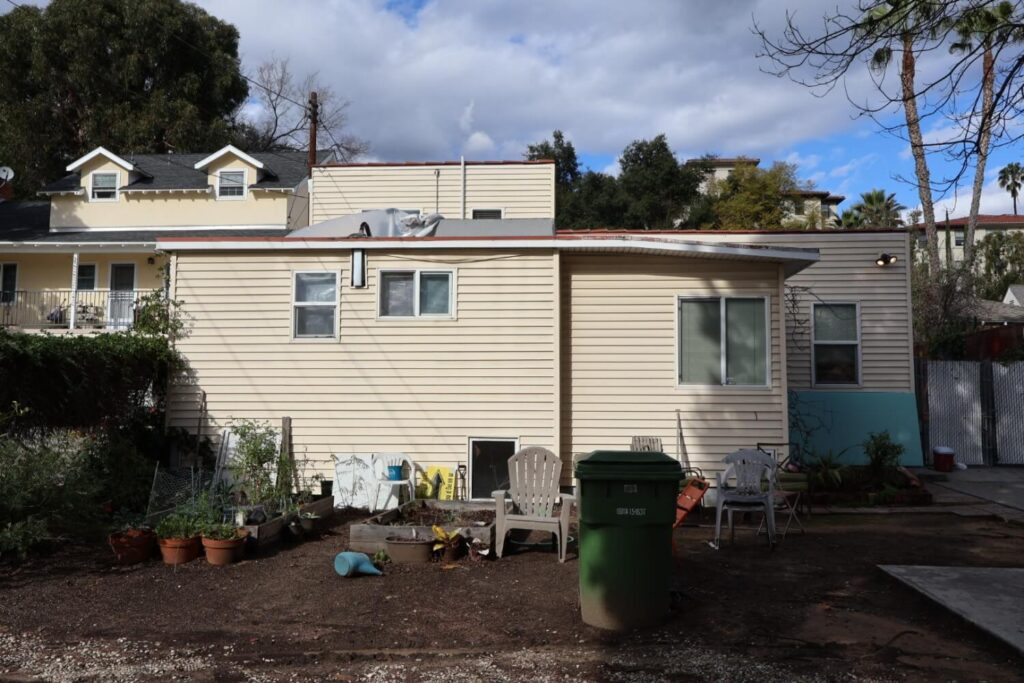
This Spring semester, Occidental’s campus Facilities Management confirmed to Sadie Spletzer (sophomore) and their seven housemates that Food Justice House, a themed living community, was subject to a black mold outbreak. The outbreak has resulted in a temporary relocation of the residents to various vacant dorms across campus. According to Spletzer, respiratory symptoms such as colds, coughs and daily headaches were prevalent in their life prior to their move.
Environmental health and safety manager Joshua-David Fischler is in charge of mold outbreaks within residences. According to Fischler, a small opening in the roof of the Food Justice House by the water heater vent was slowly leaked on, creeping towards the residence’s drywall. The black mold met the latex paint of the wall and started to bubble up until it was visible, Fischler said via email.
“Mold is a type of fungus, just like yeast or many other different fungi out there. All molds reside outside and inside and everywhere. Right now as we’re talking, we’re breathing in mold spores,” Fischler said.
Fischler said there tends to be an unnecessary collective fear towards mold. According to Fischler, black mold — scientifically known as Stachybotrys chartarum — is rare and has historically been feared to cause infant pulmonary hemorrhaging.
“There’s actually not been any strong evidence that Stachy causes severe deadly conditions,” Fischler said. “Black mold is a big scare, but I really want people to understand mold isn’t as dangerous as a lot of people make it sound. It’s something you don’t want to live with… but just because you think there’s mold doesn’t mean your health is at risk.”

According to Fischler, mold needs water and cellulose, and in the case of Occidental’s campus, the cellulose is most often in the form of wood or drywall. Fischler said exposure to mold can become dangerous in instances of extended exposure or when those exposed have autoimmune disorders.
When mold is found in a room, residents most often inform Facilities through a work request or their Resident Assistant who then relays the issue to a faculty residential advisor.
“Facilities Management is responsible for the physical management of our residence halls, and REHS closely partners with Facilities, as our department’s role is to ensure a positive residential experience for all students,” said Isaiah J. Thomas, Director of Residential Education and Housing Services (REHS), via email.
Spletzer said they felt discontent about the ways in which residential housing took on the issue.
“The policies surrounding what Facilities did, they’re doing a lot, they’re at the house probably every day. REHS on the other hand, I wish they had given us more information,” Speltzer said. “They didn’t have a room for us right away. [When they did] they only gave us 30 minutes to get a new room.”
Spletzer said the outbreak has resulted in a loss of community and accommodations provided through Food Justice Hall. Currently, Spletzer and their two roommates live in Norris Hall in what were once COVID-19 isolation halls. In Norris, they are unable to fulfill the desires of the food justice themed living community, according to Spletzer.
“We were in Food Justice to make our own food. I can’t really eat the stuff in the marketplace because I’m gluten free and almost vegan,” Speltzer said.
Due to the resident’s inability to make their own food and accommodate for their dietary needs, Occidental has provided them with meal money for the duration of their Norris stay according to Spletzer. Additionally, Spletzer said relocation to Norris disregards their accommodation request for housing on lower campus.
According to Fischler, who is currently the sole person responsible for addressing all of the mold outbreaks within the community, members of the Food Justice house will, in the best scenario, be back in the house in the coming days.
Contact Shea Salcedo at ssalcedo@oxy.edu
![]()






























